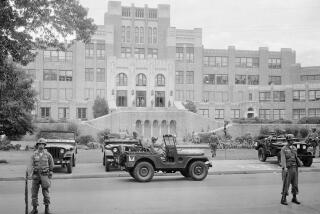Ricci vs. DeStefano: A test on race
On Wednesday, the Supreme Court heard oral arguments in one of several cases about race that it will decide this term. The issue the court will consider in Ricci vs. DeStefano is whether a city fire department’s decision to abandon its reliance on a standardized, multiple-choice exam in promotions violated the constitutional rights of the primarily white firefighters who had gotten high scores on the test.
The court’s conservative bloc has made its views on race known. As Chief Justice John G. Roberts Jr. once put it: “The way to stop discrimination on the basis of race is to stop discriminating on the basis of race.” But as the Ricci case makes clear, it’s not always that simple.
The exam at issue in Ricci was given in 2003 to more than 100 New Haven, Conn., firefighters competing for eight vacant lieutenant positions and seven vacant captain positions. But although a number of African American and Latino firefighters passed the exam, only two Latinos and no African Americans scored high enough to make the promotion list. The fact that virtually all of the 15 promotions were likely to go to white firefighters caused the city to look carefully at its test and consider whether there were better criteria for evaluating applicants that would result in more racially diverse leadership in the fire department.
In part, the city’s reaction was defensive. Because of the magnitude of the racial disparity on the exams, which would have ensured that white firefighters received the great majority of the promotions, an attorney for the city concluded that there was a strong likelihood of a lawsuit by African American and Latino firefighters if the promotion list generated by the test were used. Since Title VII was signed into law in 1964, it has been illegal for employers to use tests that have an unjustified racially “discriminatory effect.”
That raised the question of whether a fill-in-the-bubble exam was really the best way to evaluate whether someone was suited to a leadership position in the fire department. In fact, the company that made the test admitted that some of the items were “irrelevant” in New Haven. One question, for example, asked the test-takers whether fire equipment should be parked “uptown, downtown or underground when arriving at a fire.” The question was based on information relevant to New York City firefighters, and was on the exam even though the city of New Haven has no “uptown” or “downtown.”
The fact that whites were disproportionately represented among the top scorers on the test is not surprising. Whites and some Asian American groups, on average, score higher than African Americans, Latinos and other Asian American groups on fill-in-the-bubble tests. Researchers have offered a host of reasons to explain racial gaps in test scores, including disparities in financial, educational and cultural resources, as well as psychological phenomena.
But New Haven did not scrap its promotion list simply because whites had higher scores on the test than minorities. The city understood that Title VII does not automatically prohibit employers from using tests on which whites do better than minorities. In fact, the law acknowledges that tests are useful for evaluating and comparing job applicants. But, under Title VII, it would be illegal for a city to promote firefighters based largely on a test that is not a good measure of a junior firefighter’s worthiness to be promoted.
New Haven’s attorney correctly interpreted Title VII to mean that the city’s firefighter test should measure “who is going to be a good supervisor ultimately, not who is going to be a good test-taker.” In other cases, judges have concluded, based on expert testimony, that written, multiple-choice tests for firefighter promotion like the one in this case contain the “fatal flaw” of failing to test for “supervisory ability.” The company that made the New Haven Fire Department exam acknowledges that its test does not include any questions that measure a test-taker’s ability to supervise or lead other firefighters in the line of duty.
New Haven’s potential liability was made greater by the fact that the city has been advised by testing experts, before making the promotions, that alternative, better tests were available. One expert in firefighter examinations told the city about promotion tests that produced less racial disparity.
If top-scoring firefighters are successful in mischaracterizing their case as one involving so-called reverse discrimination, the city of New Haven could be forced to again rely on a measurement tool not designed to identify individuals with the skills, problem-solving abilities and “command presence” to lead a fire department. Such a result would be inconsistent with the anti-discrimination requirements of Title VII and would discourage public and private employers from complying with Title VII.
In a case decided almost 40 years ago, Griggs vs. Duke Power Co., the Supreme Court explained that Title VII “has not commanded that the less qualified be preferred over the better qualified simply because of minority origins.” Instead, the court said, “What Congress has commanded is that any tests used must measure the person for the job and not the person in the abstract.”
So far, two lower courts have examined the evidence in the Ricci case, and both the federal district court and the U.S. 2nd Circuit Court of Appeals sided with the city’s decision to scrap the exam. Now we have to hope that the Supreme Court will understand that New Haven’s decision was not just good racial policy. It was good policy.
Kimberly West-Faulcon is a constitutional law professor at Loyola Law School and the former Western regional director-counsel of the NAACP Legal Defense and Educational Fund.
More to Read
A cure for the common opinion
Get thought-provoking perspectives with our weekly newsletter.
You may occasionally receive promotional content from the Los Angeles Times.






